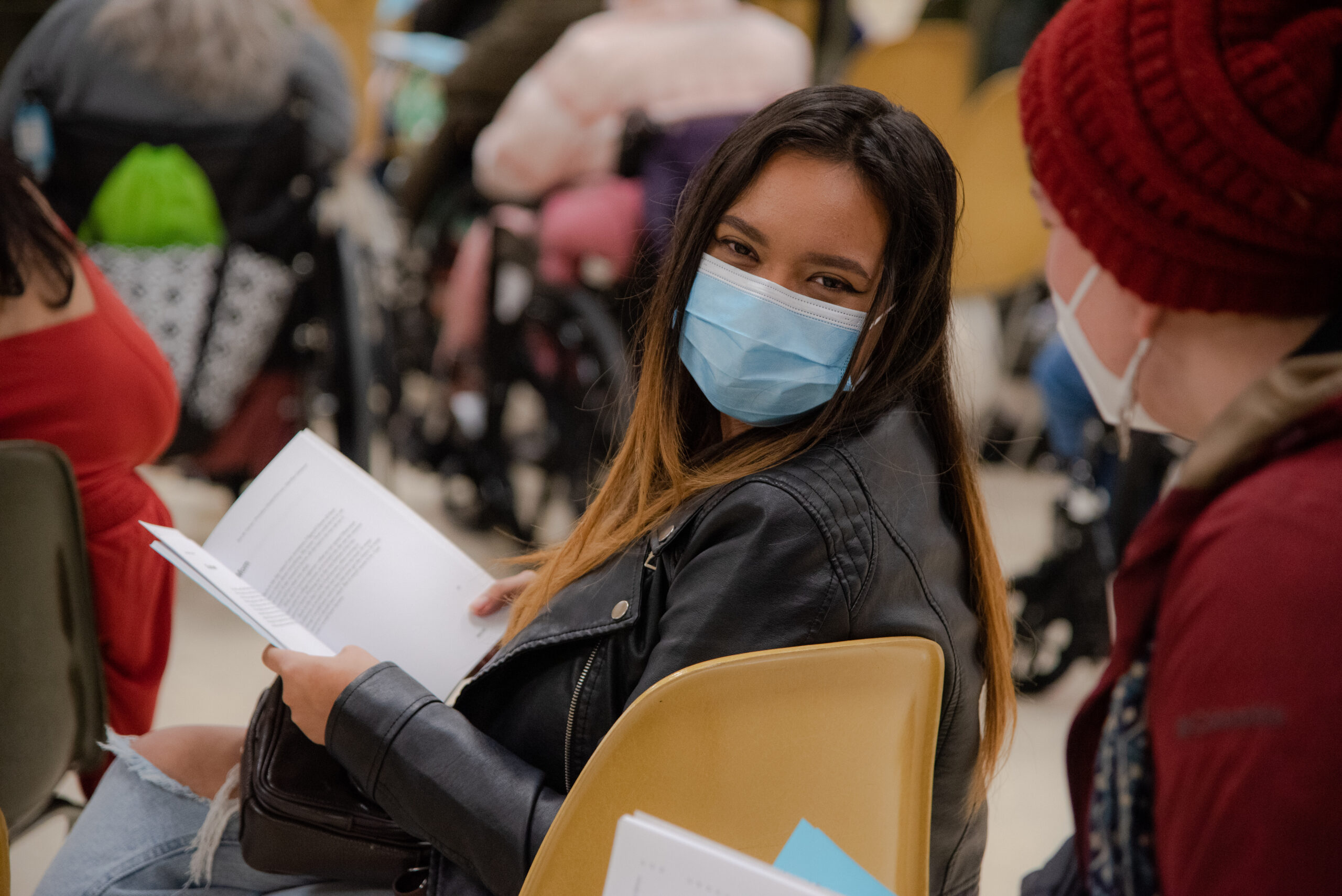
Our Strategic Plan
Updated Fall 2024
Focus Areas
Click the links below to jump to different parts of the plan:
Context Statement
This plan began in 2017 as Write Around Portland leadership and staff engaged in brainstorming and planning, and later met individually with stakeholders to review options and avenues for the future. The organization engaged in a Development Audit in 2018, and in that year also convened a Racial Equity Assessment Committee that eventually developed a Racial Equity Report that helped to guide decision-making. Based on that work, a strategic framework was developed in 2019 with the intent to gather input from the community before creating full-scale strategic plans governing 2020-2023 and 2024-2027.
Unfortunately, the COVID pandemic presented a massive interruption. In March 2020, Write Around Portland suspended all programming as leadership and staff implemented annual action plans to respond to the pandemic. In 2022, several staff transitions also necessitated a pause while the organization determined safe ways to carry out its mission, support its writers, and hire new staff. The organization used 2023 to stabilize revenue, (re)engage with its stakeholders, and operate its programming in a new, post-pandemic landscape.
As we move into the future, Write Around Portland’s leadership and staff recognize that destabilizing forces external to the organization will continue to present challenges to future planning. The world is still dealing with a pandemic, and climate-related disasters present greater threats than ever. However, we also know that our work is also more important than ever. In the context of destabilization, the stories we tell about our community remain of vital importance. Stories help us understand our community, our world, and our moment. We have a choice about what stories we adopt, share, listen to, and honor. We firmly believe that Write Around Portland will continue to play a key role in bridging polarization, healing trauma, and strengthening communities for years to come.
Therefore, we wrote our strategic plan to prioritize adaptability while maintaining our values. We are moving away from traditional three-year strategic planning in favor of a plan that will be revisited twice annually and updated in response to learnings, feedback, and experimentation. This plan is a living document that will change. Our Board of Directors and staff will set the overall vision, and the Board will advise the staff on possible tactics and priorities. It is the staff’s role to continually find ways to move toward our ambitious goals while prioritizing our financial health, values, culture, and — most importantly — our writers.
Though there are many challenges that face small nonprofit organizations – especially those in the arts space – we are more confident than ever that our mission and programs are essential to supporting our community. We express our deepest gratitude for our writers, volunteers, donors, and agency partners as we continue to celebrate respect, writing, and community!
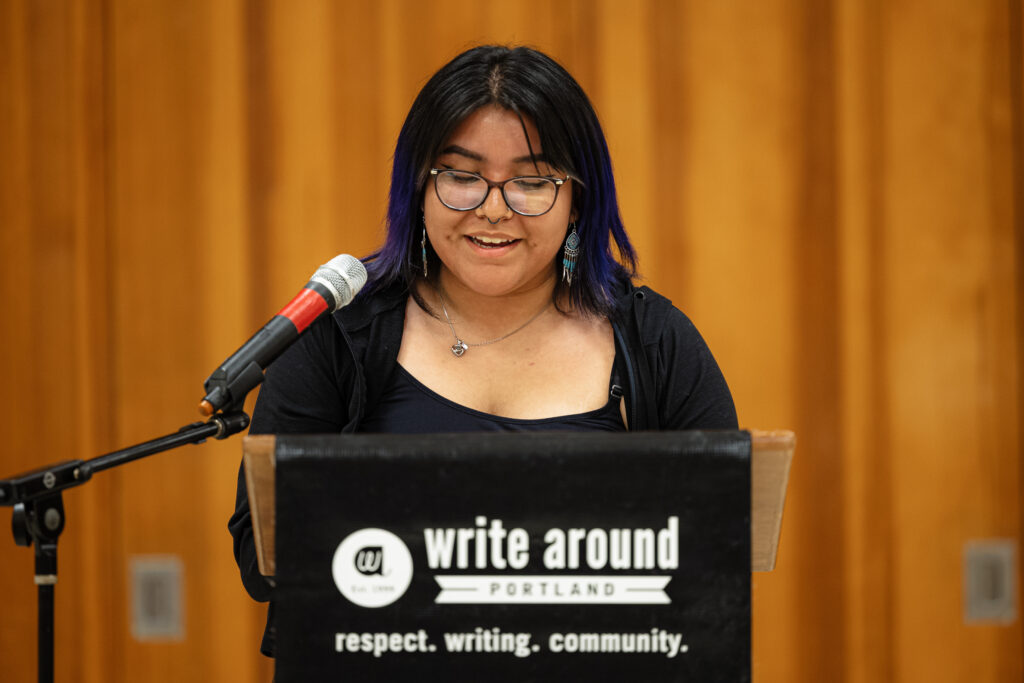
Focus Area #1:
Prioritize diversity, equity, inclusion, and access in program delivery to agency partners
Our programs foster compassion, initiate healing, and strengthen communities. To truly build an equitable program, we need to deliver our programs to BIPOC, immigrant, and refugee communities who have been and continue to be deeply impacted by COVID-19, economic uncertainty, addiction, mental illness, healthcare inequality, mass incarceration, and other entrenched 21st century problems. We will continue to honor, uplift, and prioritize our most vulnerable as we plan our programming priorities in the future.
Currently, we are underserving some priority populations, including immigrants and refugees, and we struggle to partner with culturally specific and rural organizations. We question what barriers are arising that may be turning away these agencies, and we’ll continue examining our practices to prioritize the development of partnerships that are mutually-beneficial, equitable, and non-extractive.
Additionally, we recognize the deep need for creative expression inside prisons and locked facilities, and seek to prioritize this specific population as we plan for the future. However, bureaucracies can make deploying volunteers quite a headache due to long background check processes. We would like to increase staff FTE in order to address the unique needs of prisons and locked facilities, which could include paying facilitators to reduce barriers.
| Strategic Priorities | Success Indicators |
| Serve more immigrants, refugees, and BIPOC writers in our community compared to census numbers. | – 5% more BIPOC writers, immigrants, and refugees are writing in our programs compared to census data percentages – We are working with several culturally-specific organizations each season, and have developed strong relationships with them – We have a deep bench of BIPOC facilitators willing to facilitate 6-10 week agency workshops |
| Update our service area and provide programming options for communities outside our service area. | – We understand the needs and concerns of communities and agencies outside of the city of Portland – We are working with several rural agencies each year, and have developed strong relationships with them – We have a deep bench of facilitators willing to facilitate rural workshops |
| Serve more writers who are in prisons or locked facilities. | We are working with several prisons and locked facilities each year, and have developed strong relationships with them |
| Continue to make decisions following Diversity, Equity, Inclusion, and Access understandings. | Out policies reflect our current understandings and values. |
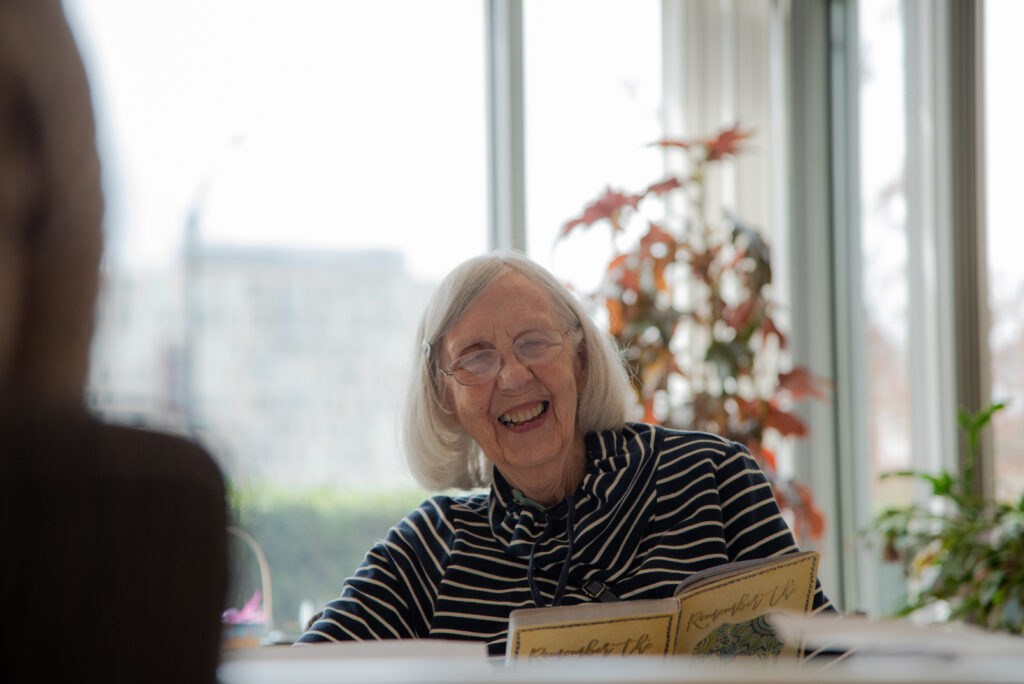
Focus Area #2:
Serve writers who aren’t associated with an agency or whose agency chooses not to partner with us
Write Around’s programming is deeply valued by many participants. In fact, we consistently hear from participants that their experience was profound and lifechanging. However, if folks are not associated with an agency – or if their agency does not partner with us – writers have very few options for engagement. As we look to the future, we want to host more of our own programming to reduce barriers for participation. We’re starting this work by growing programs that already exist – Resonate, Write On, and Seasoned Writers. But as a result of some refinement in program outcomes, we hope to explore more ideas for bringing more programming to anyone in our community who’d like to write with us.
| Strategic Priorities | Success Indicators |
| Expand Resonate: A BIPOC Writing Circle by including in-person programming, readings, and publishing opportunities. | – On average, our Resonate workshops are 75% full (registrants, not attendees) – More writers are joining Resonate than are lapsing – We have a deep bench of BIPOC facilitators who can facilitate Resonate workshops |
| Host Write On, Seasoned Writers, and other programming to continue to engage writers. | – On average, our Write On and Seasoned Writers workshops are 75% full (registrants, not attendees) – We have a deep bench of facilitators who can facilitate these workshops |
| Refine program delivery. | – Our program outcomes represent our current values and understandings of the power of our program – Our program evaluations are used as data to inform program revisions as necessary |
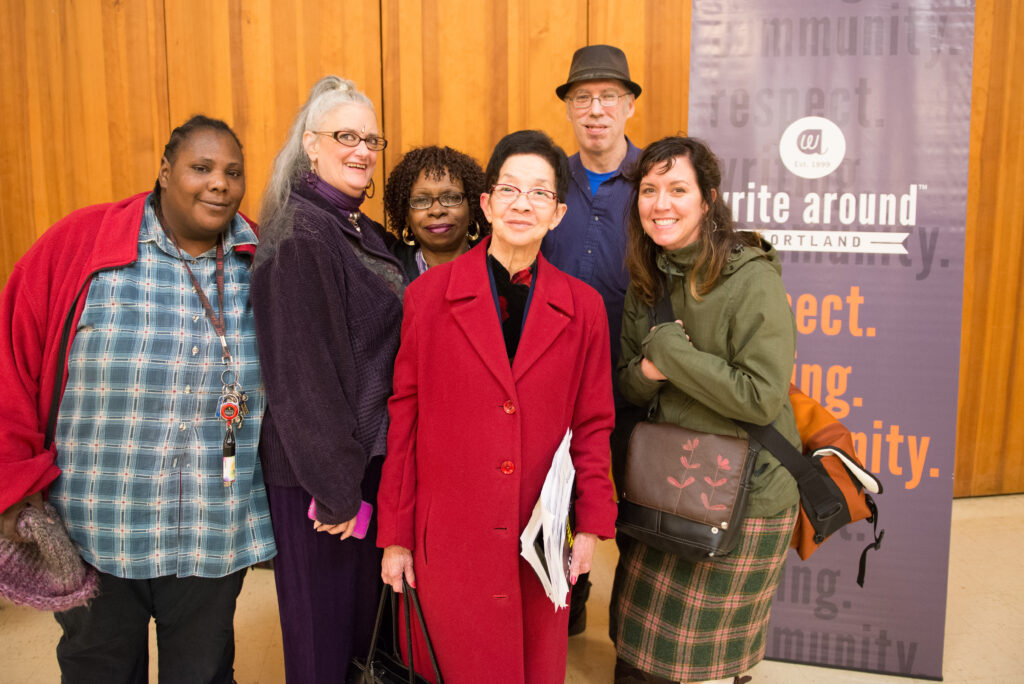
Focus Area #3:
Build a literary community and third major revenue stream
As with any other nonprofit organization that relies on donations, Write Around Portland must continue to find ways to bring in more donors than it loses each year. And though we feel that Write Around’s programming and values have a wide appeal, the reality is that only a certain subset of people will understand the power and importance of creative writing. Thus, we seek to build out a “literary program” that will help us connect with more writers both locally and nationally. While writers are not generally considered to be a wealthy group of people, we feel that broadening our reach can only benefit us, and that small-dollar donations and monthly giving can support sustainable, year-over-year funding, representing an important funding stream in a diverse portfolio of fundraising activities. Finally, we are completing the third year of a three-year pilot with Lewis & Clark College that utilizes our writing program to help first year college students adjust to living on their own. We will use this exciting opportunity to build out a curriculum that could be used in other colleges and universities.
| Strategic Priorities | Success Indicators |
| Continue to refine and add to existing fee-for-service program offerings. | – On average, our fee-for-service workshops are 75% full (registrants, not attendees) – We have a deep bench of facilitators who can facilitate these workshops – We are recognized as a leading literary organization by professional writers in the Pacific Northwest |
| Establish a program specifically to support college students. | We have a complete curriculum to offer area colleges and universities. |
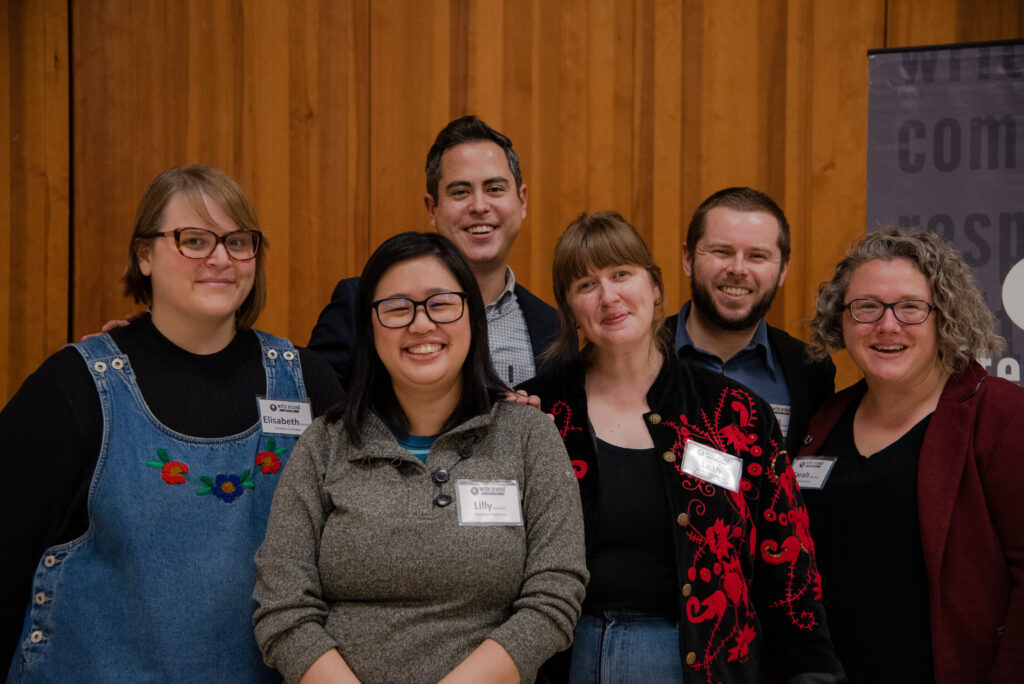
Focus Area #4:
Provide meaningful and supportive staff and volunteer experiences
Write Around Portland’s last strategic plan emphasized growing the development team to address funding concerns and grow our programs. As we look toward the next few years, we’ll hopefully see an uptick in donations that will allow us to expand our programming. From our vantage point now, we see an opportunity to add a fellowship program that could provide us with programmatic support while also introducing and infusing our organization with fresh ideas from newly graduated BFA and MFA creative writing students. This program would also strengthen our relationships with strategic university partners and further establish us within the literary scene both locally and nationally.
In our volunteer program, we see the need to continue providing supports and tools for our volunteer facilitators as they move into spaces with higher acuity than ever. We have long used a trauma informed lens in our work, but feel the need to be more explicit in its use as we train facilitators.
| Strategic Priorities | Success Indicators |
| Continue to provide a supportive and congenial staff environment. | – Write Around continues to be viewed as a great place to work – We retain our talented staff members |
| Continue to provide high quality volunteer experiences, especially for facilitators | – We maintain a healthy bench of facilitators who continue to support our agency workshops – We retain our wonderful corps of volunteers, increasing the average tenure |

Focus Area #5:
Achieve financial Sustainability
Inflation has caused Write Around Portland’s expenses – particularly for staff salaries and benefits – to increase. We have utilized a deficit budget for the past two years to wind down a healthy cash reserve and add another development staff member. We should see our finances start to balance as fundraising revenue increases. Our goal is to confidently budget a net zero or net surplus budget, and many of our focus areas and strategic priorities that require funding will need to wait until we have a balanced budget. In addition to traditional development and marketing tactics (see annual plans for specific details), we’re also working to better state our “case for support,” especially to lay audiences.
| Strategic Priorities | Success Indicators |
| Use the new case for support to update and unite all communications to make the case for donating to Write Around. | – Our donors and volunteers understand what our programs do and why we do it – Our agency partners understand the impact our program has on their clients and community |
| Develop a planned giving marketing strategy. | – We begin to be notified of estate gift commitments – Estate gifts become part of our revenue mix |
| Engage in a revision of our brand promise. | Our marketing materials and website feel fresh and follow the latest in marketing best practices. |
Glossary
| ADA | Initialism for Americans with Disabilities Act |
| Agency Partner | Organizations we collaborate with to produce our core work. Agency Partners provide the participants and space for our agency workshops to function. They also pay a fee for our service. |
| Agency Workshop | Workshops that are provided for participants, free of charge, in collaboration with area nonprofits and other organizations |
| Anthology | A book that consists of writing by different authors |
| BFA | Initialism for Bachelor of Fine Arts |
| BIPOC | Acronym for Black, Indigenous, and People of Color |
| Board | Board of Directors |
| Case for Support | A foundational communications document for nonprofits that answers the question, “Why should I donate to your organization?” |
| Development | Another word for fundraising |
| Facilitator | Volunteers who lead our workshops after going through a competitive application process and a 27-hour training with staff |
| Freewrite | Writing without self-editing, set to a specific time limit |
| FTE | Initialism for Full Time Employee, often used to represent adding additional paid hours to an organization |
| MFA | Initialism for Master of Fine Arts |
| Participant | People who participate in our workshops |
| Planned Giving | A way to make a “future gift” to a nonprofit organization through donating a portion of an estate or through other giving vehicles |
| Racial Equity Framework | A tool developed at Write Around Portland to guide assessments of current policies and programs using a racial equity lens |
| Reading | An event where a writer or writers read their work to an audience |
| Resonate | A Write Around Portland program that consists of workshops specifically for BIPOC folks |
| Seasoned Writers | A Write Around Portland workshop series that is entirely led by participants |
| Trauma-Informed Care | Trauma-informed care shifts the focus from “What’s wrong with you” to “What happened to you?” It acknowledges that people are more than their diagnoses or labels. |
| Workshop | Programming at Write Around Portland that consists of freewriting, sharing, and feedback |
| Write On | A Write Around Portland workshop series for participants who have participated in our workshops before |
